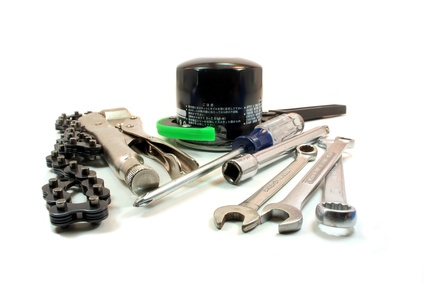
When an oil filter goes bad, you may not have any clue at all. Oil filters are designed with a safety feature that allows unfiltered oil to continue into the engine, because unfiltered oil is still more beneficial than no oil at all. Despite this safety feature, there are minor telltale clues that it may be time to replace your oil filter.
A dirty, clogged or failed fuel filter will not in and of itself cause the car's check engine light to come on. When an oil filter malfunctions, debris in the oil makes its way to the engine. This debris can, over time, gum up the inner workings of the engine, causing other parts to malfunction and fail. When this happens, the check engine light comes on as an indicator of a problem. Seek the help of a professional mechanic to determine the exact reason your check engine light is on. Once the immediate problem is remedied, your mechanic can help you determine the underlying cause of the symptom, which may be traced back to a faulty oil filter.
When two car parts rub against each other without the proper quality or amount of lubrication, heat results. As damage occurs as a result of friction, other parts of the engine begin to wear out, causing additional strain on the car's cooling system. In addition to this, as sediment from improperly filtered oil builds up on your engine, deposits of minerals can occlude heat conductivity. When this happens, the engine overheats. The normal temperature range of an engine is between 195 and 220 degrees Fahrenheit. When temperatures exceed this range, the car is said to be "running hot." Your car's temperature gauge will show that the car is overheating. Cars experiencing overheating may stall, idle roughly or belch smoke. Turn your car's heat up to the maximum setting until you can drive safely home or to a mechanic. Turning on the heat allows the hot air from the engine to enter the cab, venting the engine. A mechanic can determine the source of the heat and the underlying cause, which may be a bad oil filter.
A damaged or clogged oil filter can't adapt to the changes in temperature within the engine. In extreme cases, these faulty oil filters can burst or rupture. When this happens, the oil re-circulates or leaks back into the oil pan. This, in turn, can cause oil to leak out of the pan and onto the surface below. As a result, the oil pan can sustain damage and may need to be repaired in addition to replacing the bad oil filter. Oil leaks are hazardous to the environment and wildlife and require extensive clean-up. Oil that has been neutralized can still stain asphalt. Seek the help of a professional mechanic if any fluid is leaking from your car.